人教版八年级下册 Unit 10 I've had this bike for three years. Section A 1a-2d 课件(共37张PPT)
文档属性
| 名称 | 人教版八年级下册 Unit 10 I've had this bike for three years. Section A 1a-2d 课件(共37张PPT) | 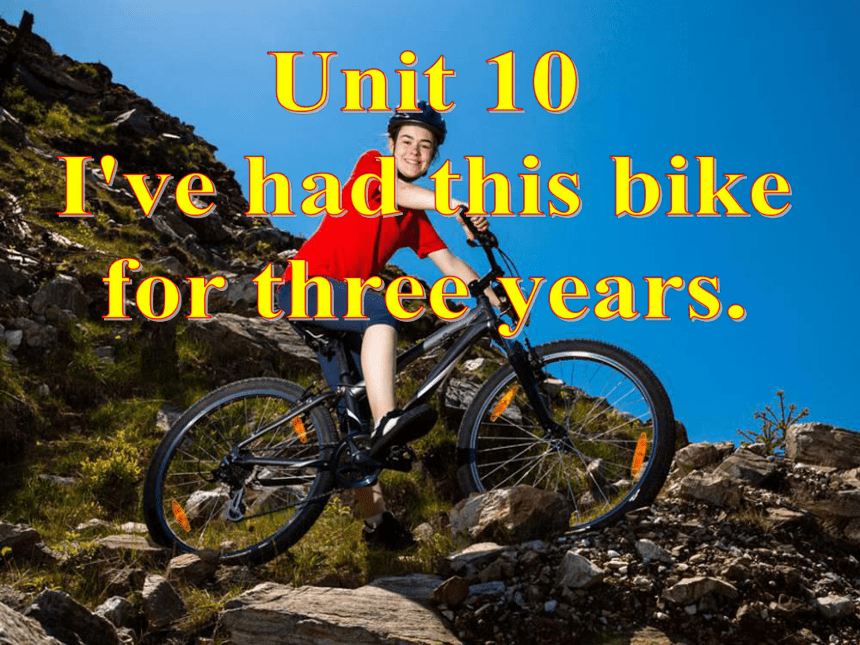 | |
| 格式 | ppt | ||
| 文件大小 | 2.3MB | ||
| 资源类型 | 教案 | ||
| 版本资源 | 人教新目标(Go for it)版 | ||
| 科目 | 英语 | ||
| 更新时间 | 2023-03-16 14:56:39 | ||
图片预览

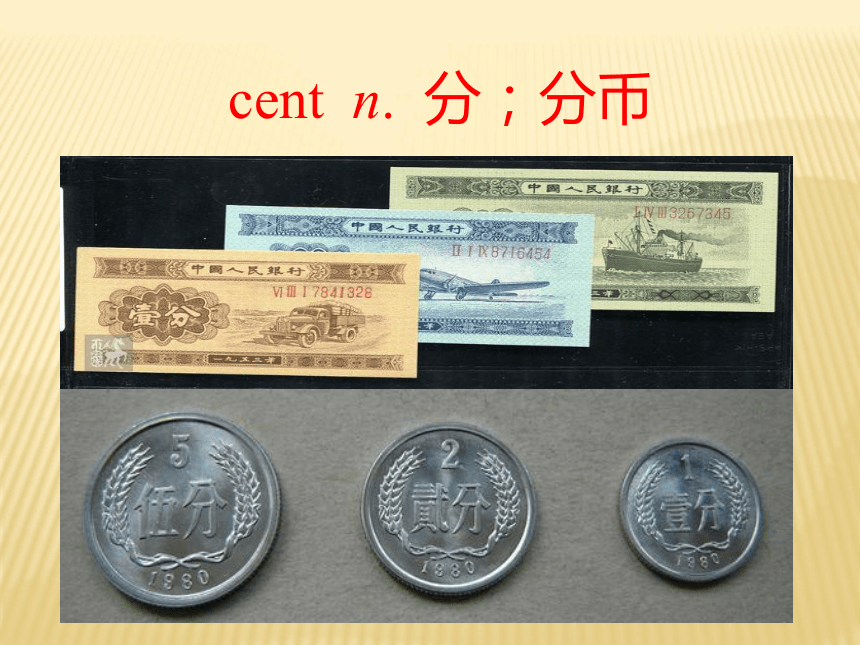
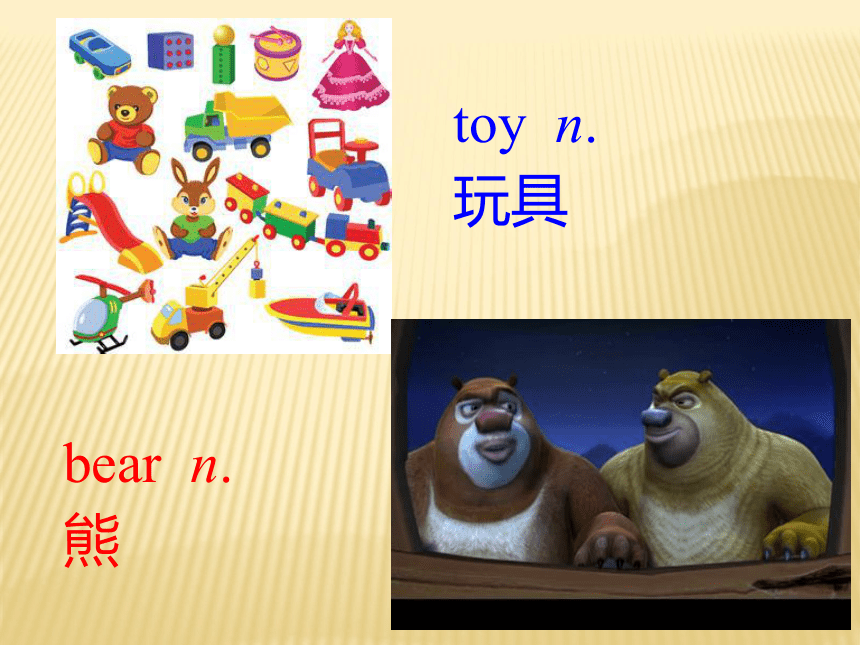
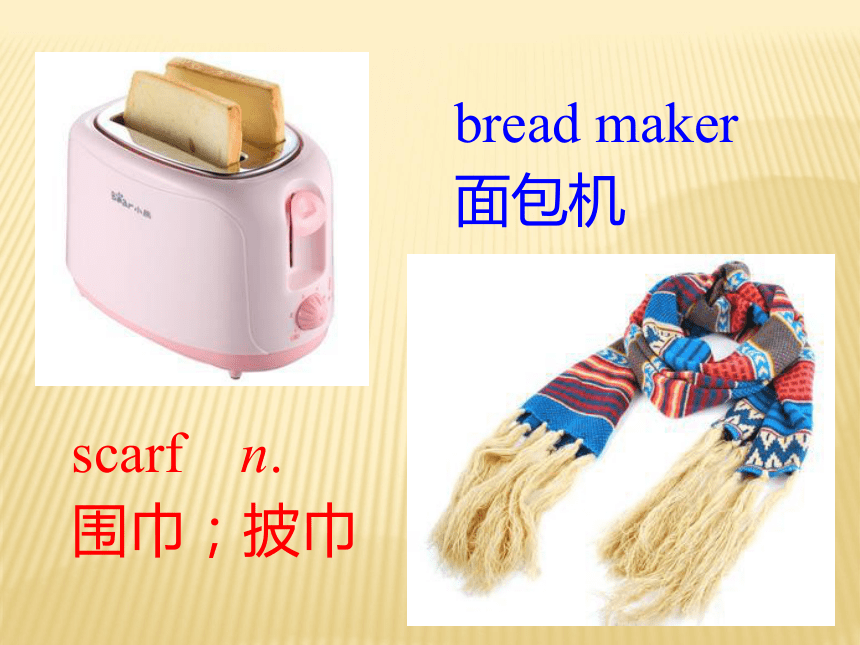
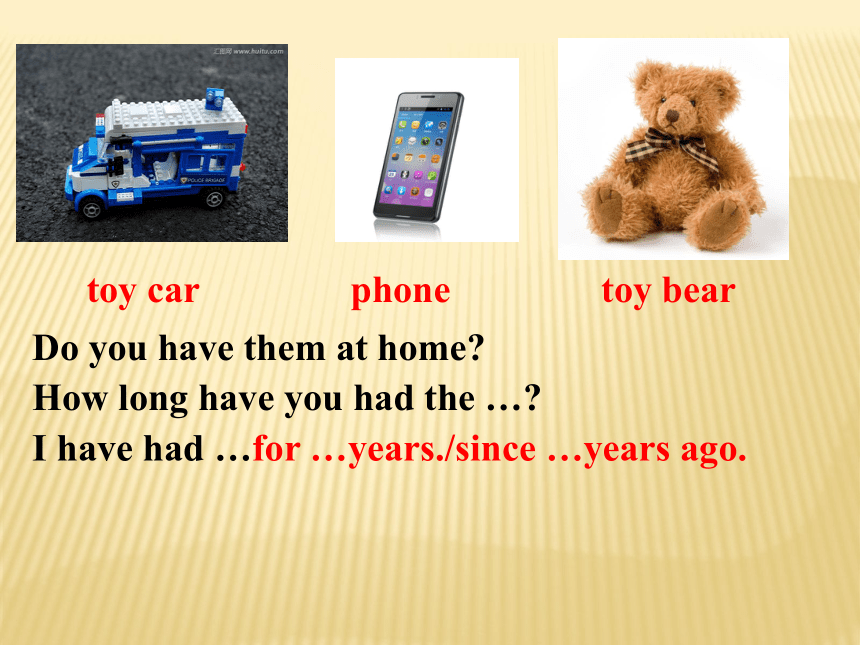

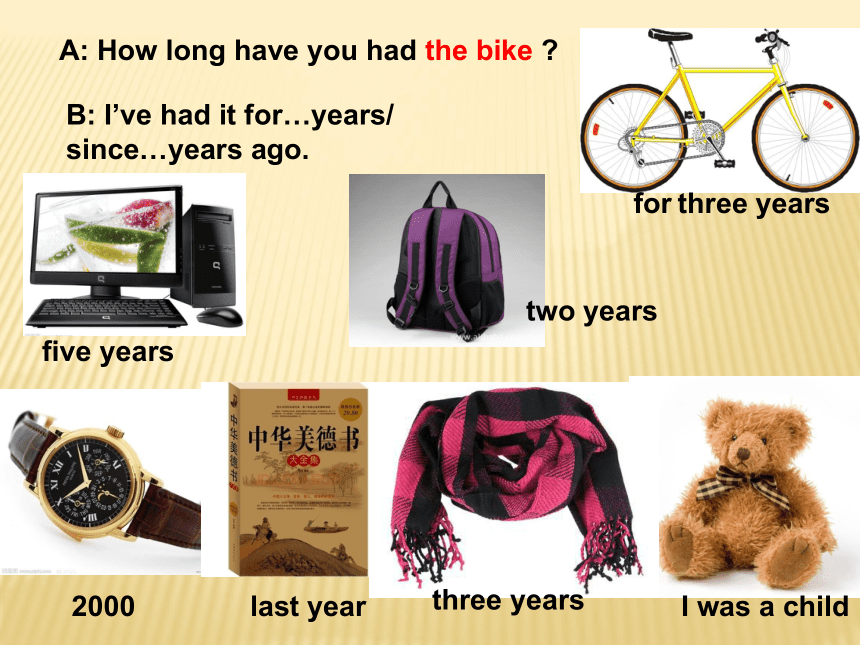
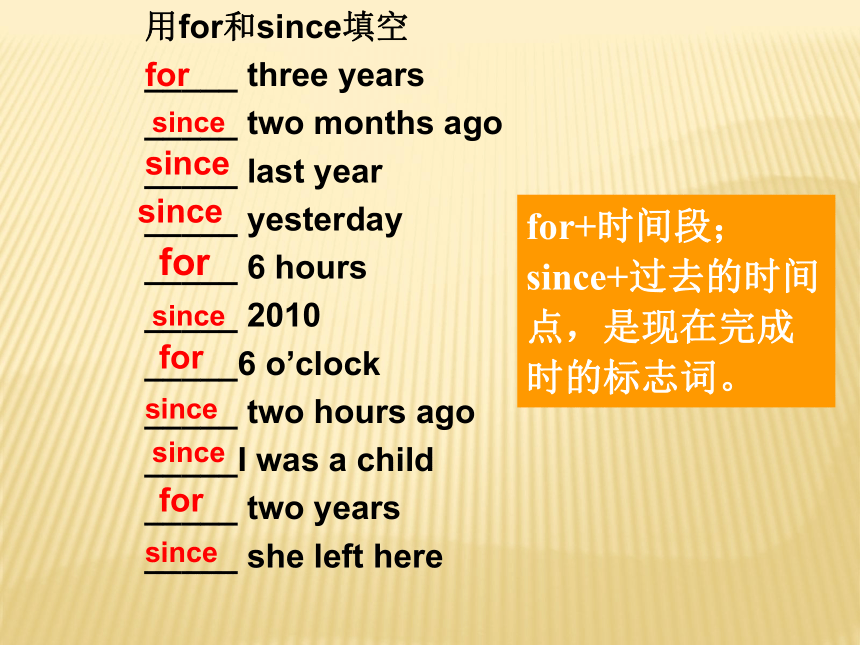
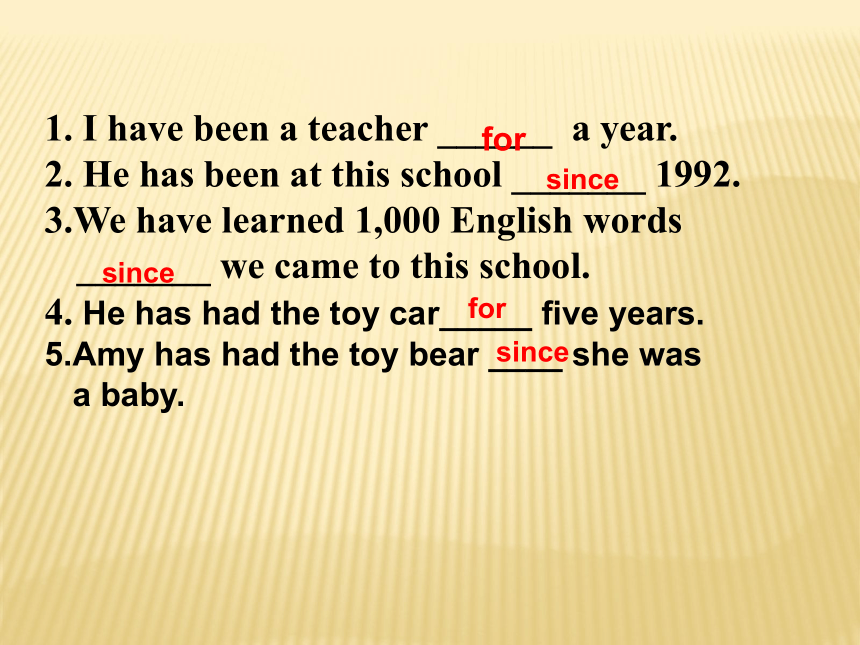
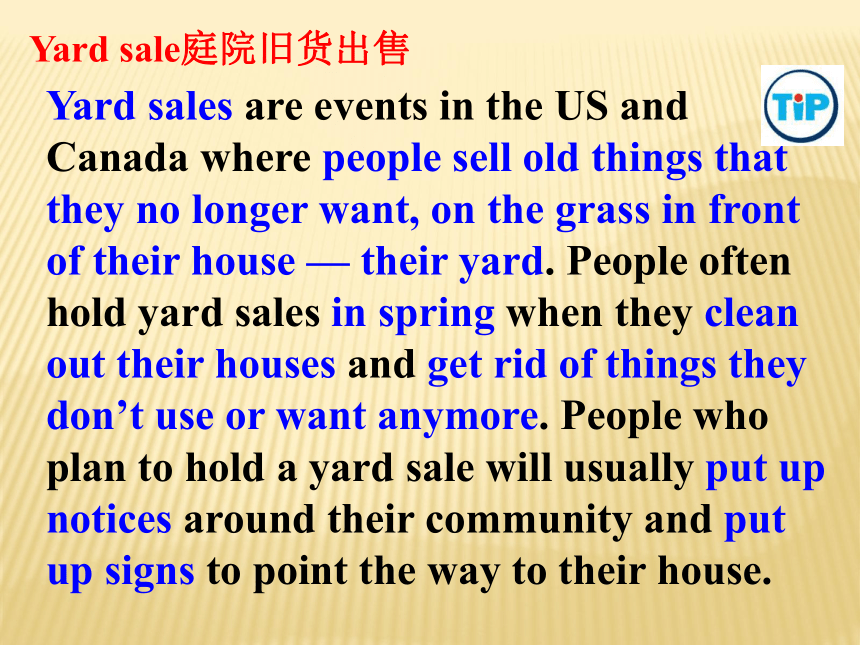
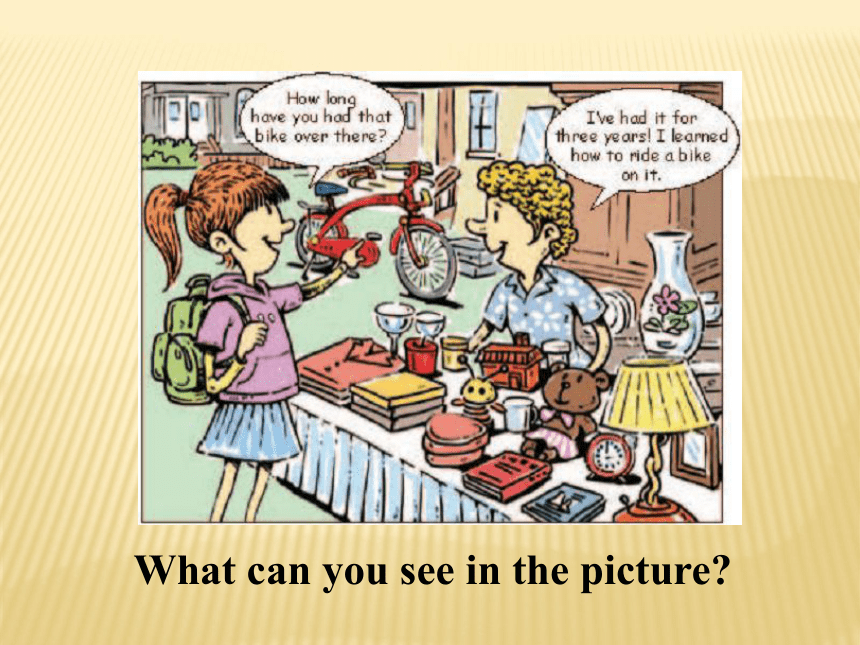
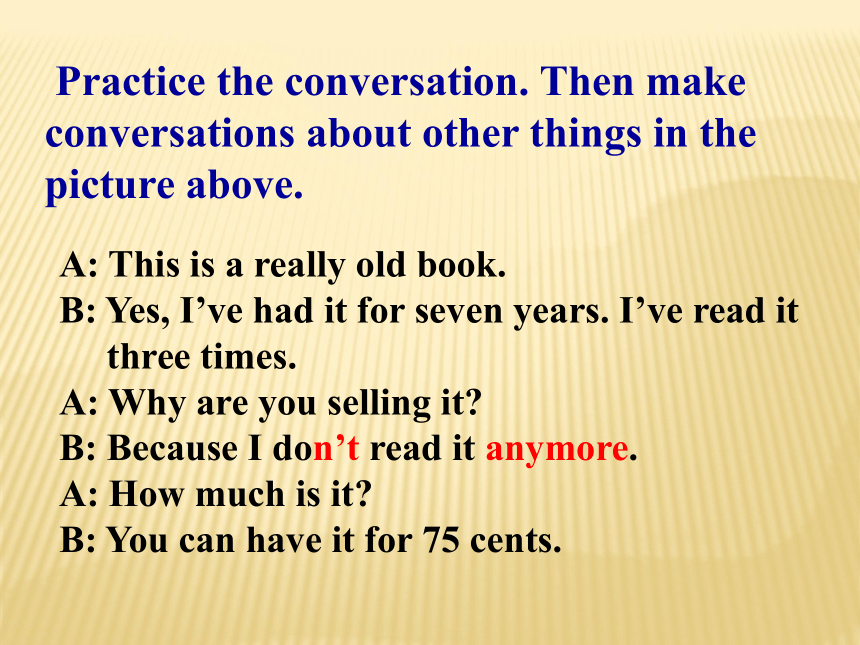
文档简介
(共37张PPT)
cent n. 分;分币
toy n. 玩具
bear n. 熊
bread maker 面包机
scarf n. 围巾;披巾
toy car
phone
toy bear
Do you have them at home
How long have you had the …
I have had …for …years./since …years ago.
sweater
dress
scarf
How long have you had the …
I have had …for …years./since …years ago.
A: How long have you had the bike
B: I’ve had it for…years/
since…years ago.
for three years
five years
2000
I was a child
last year
two years
three years
用for和since填空
_____ three years
_____ two months ago
_____ last year
_____ yesterday
_____ 6 hours
_____ 2010
_____6 o’clock
_____ two hours ago
_____I was a child
_____ two years
_____ she left here
for
since
for
for
for
since
since
since
since
since
since
for+时间段;since+过去的时间点,是现在完成时的标志词。
1. I have been a teacher ______ a year.
2. He has been at this school _______ 1992.
3.We have learned 1,000 English words _______ we came to this school.
4. He has had the toy car_____ five years.
5.Amy has had the toy bear ____ she was
a baby.
since
since
for
for
since
Yard sales are events in the US and Canada where people sell old things that they no longer want, on the grass in front of their house — their yard. People often hold yard sales in spring when they clean out their houses and get rid of things they don’t use or want anymore. People who plan to hold a yard sale will usually put up notices around their community and put up signs to point the way to their house.
Yard sale庭院旧货出售
What can you see in the picture
Practice the conversation. Then make conversations about other things in the picture above.
A: This is a really old book.
B: Yes, I’ve had it for seven years. I’ve read it
three times.
A: Why are you selling it
B: Because I don’t read it anymore.
A: How much is it
B: You can have it for 75 cents.
A: This is a really beautiful vase.
B: Yes, I’ve had it for … years.
A: Why are you selling it
B: Because ...
A: How much is it
B: You can have it for ...
Example:
1. Amy has had her favorite ______ for
three years.
2. Amy has had the boy _____ since she
was a ______.
3. Amy’s mom has had the old bread for
more than _____ years.
4. Amy can give away the _______ and
______ because they do not fit her
anymore.
book
bear
baby
10
sweater
dress
1. Amy wants to give away the _____.
A. book B. magazine C. bear D. hat
2. Why does the bear has special meaning to
Amy
A. Because her father bought it for her.
B. Because her Grandpa bought for her.
C. Because her Grandma bought for her.
B
C
3. Where can Amy take these things
A. the children’s home
B. the old people’s home
C. the teachers’ home
A
1. The house has a small _____ (院子).
2. The pineapple was ______ (甜的).
3. All these facts were stored (储存) in his
________ (记忆).
4. Put your _____ (玩具) away now — it's
time for bed.
5. I like chocolates with _____ (not hard)
centres.
6. You should always _____ (检查) your oil
before taking your car on a long trip.
yard
sweet
memory
toys
soft
check
二、动词填空:
1._____ you ________(clean) the room
Yes, we __________(do) that already.
When _______ you ______(do) it
We _______(do) it an hour ago.
2.______ he ______(see) this film yet Yes.
When _____ he _____(see) it
He ______ it last week.
3. How many times _____you ______( come) here
Once.
Have
cleaned
have done
did
do
did
Has
seen
did
see
saw
have
come
A: Amy, can we give away these soft toys
B: Mom, I want to keep the bear.
A: Why It’s so old.
B: Because I’ve had it since I was a baby.
Linda: Welcome to Sunshine Home for
Children. I’m Linda.
Amy: Hi, I’m Amy. I have some things for the
kids. I’ve had this magazine for a coupe
of months. The stories inside may be a bit
old, but they’re still interesting.
Linda: Great! Many children here love reading.
Amy: And check out these soft toys and board
games for younger kids. I’ve had them
since I was a child. There’s also a sweater
and a dress.
2d Role-play the conversation.
Linda: Perfect! We always need toys and
clothes.
Amy: One last thing is a bread maker.
My mom’s had it for a long time
but it still works.
Linda: Thanks so much!
how long, how soon, how often, how far
How long 多久, 多长(时间)。对时间段提
问, 如: for+时间段;since+过去的时间点。
e.g. --How long have you worked in Beijing
--For five years.
1. -- How long have you had that bike there
-- I have had it for three years.
How soon多久以后。对“in+时间段提问, 常
用于一般将来时”, 其答语常用“in+时间段”。
e.g. --How soon will Mr. Li be back
--In a week.
How often 多久一次, 对频率提问, 其答语
为: once (twice/…)+时间段, always, usually
等。
e.g. --How often do you exercise
--Once a day.
How far 多远,对距离提问,其答语是
表距离的内容。
e.g. --How far is it from here to your
school
--Three kilometers.
for其后只能接表示“一段时间”的名词性短
语,可用于多种时态,表示动作或状态持
续时间段长短。
e.g. I have lived in this city for five years.
我在这座城市居住了5年了。
He usually sleeps for twelve hours
every day.
他通常每天睡12个小时。
since其后接表示“时间点”的短语或从句(过
去时),也可以接“一段时间+ago”,常用于完
成时态;还用于句型:“It is +时间段+since+
一般过去时的句子”, 表示过去某个时间发生
并持续到说话时的动作或状态。
e.g. It is two years since I came to China.
自从我到中国以来已经两年了。
She has worked here for five years.=She
has worked here since five years ago.
她在这儿工作5年了。
sale用作名词,意为“出售,销售”。on
sale意为“出售,上市”;for sale意为“待
售,供出售”,尤指从主人手里出售。
e.g. Chickens are on sale in the market.
小鸡在市场上出售。
I’m sorry, it’s not for sale.
抱歉,它不出售。
2. Jeff’s family is having a yard sale.
It’s +adj. (+for sb.) to do sth.意为“(对某
人来说)做某事是……的”,it 是形式主
语,真正主语是后面的动词不定式。
e.g. It’s important for us to learn English
well.
学好英语对于我们来说是很重要的。
3. Amy thinks it’s hard to sell her old things.
艾米认为卖掉她的旧东西很难。
4. Amy wants to keep her old things because they bring back sweet memories. 艾米想保留她的旧东西,因为它们勾起她的甜蜜回忆。
memory 作名词意为“记忆;回忆”,复数形式为memories,动词为memorize,意为“记忆,背诵”。
e.g. She has a good memory.
她记忆力好。
5. I’ve had this magazine for a couple of
months. 这本杂志我买了几个月了。
a couple of 表示具体的数量“两个”,指两个相同的人或物体; 表示数量不定的“少数几个”,作这种虚指的用法时,具体意思往往视上下文和具体的语境而决定。
e.g. You have to wait for a couple of hours for the clothes to dry completely. 你得等上一两个小时让这些衣服完全晾干。
a bit 意为“一点儿, 稍微”, 修饰形容词
或副词, 相当于a little; a bit of +不可
数名词, a little直接加不可数名词。
e.g. There is a bit of/a little water in
the bottle.
瓶子里有点儿水。
6. The stories inside may be a bit old, but
they’re still interesting.
not a bit =not at all 意为“一点也不”
not a little =very 意为“非常”
e.g. She is not a bit happy.
她一点儿也不快乐。
He is not a little tired.
=He is very tired.
他非常累。
check 用作及物动词, 意为“检查, 审查”;
check out 意为“察看,观察”。
e.g. If you finish it, check it by yourself first.
如果你完成了,就自己先检查一下。
Check out all the books for children.
察看一下所有的儿童书籍。
check还可用作名词,意为“支票, 账单”。
7. And check out these soft toys and board
games for younger kids.
1. -- __ have you been married
-- For twenty years.
A. How far B. How often
C. How long D. How soon
2. If you sit in a chair ____ a long time, your back may begin to hurt.
A. at B. in C. on D. for
C
D
3. -- I often have hamburgers for lunch.
-- You’d better not. It’s bad for you ____
too much junk food.
A. eat B. to eat C. eating D. ate
B
cent n. 分;分币
toy n. 玩具
bear n. 熊
bread maker 面包机
scarf n. 围巾;披巾
toy car
phone
toy bear
Do you have them at home
How long have you had the …
I have had …for …years./since …years ago.
sweater
dress
scarf
How long have you had the …
I have had …for …years./since …years ago.
A: How long have you had the bike
B: I’ve had it for…years/
since…years ago.
for three years
five years
2000
I was a child
last year
two years
three years
用for和since填空
_____ three years
_____ two months ago
_____ last year
_____ yesterday
_____ 6 hours
_____ 2010
_____6 o’clock
_____ two hours ago
_____I was a child
_____ two years
_____ she left here
for
since
for
for
for
since
since
since
since
since
since
for+时间段;since+过去的时间点,是现在完成时的标志词。
1. I have been a teacher ______ a year.
2. He has been at this school _______ 1992.
3.We have learned 1,000 English words _______ we came to this school.
4. He has had the toy car_____ five years.
5.Amy has had the toy bear ____ she was
a baby.
since
since
for
for
since
Yard sales are events in the US and Canada where people sell old things that they no longer want, on the grass in front of their house — their yard. People often hold yard sales in spring when they clean out their houses and get rid of things they don’t use or want anymore. People who plan to hold a yard sale will usually put up notices around their community and put up signs to point the way to their house.
Yard sale庭院旧货出售
What can you see in the picture
Practice the conversation. Then make conversations about other things in the picture above.
A: This is a really old book.
B: Yes, I’ve had it for seven years. I’ve read it
three times.
A: Why are you selling it
B: Because I don’t read it anymore.
A: How much is it
B: You can have it for 75 cents.
A: This is a really beautiful vase.
B: Yes, I’ve had it for … years.
A: Why are you selling it
B: Because ...
A: How much is it
B: You can have it for ...
Example:
1. Amy has had her favorite ______ for
three years.
2. Amy has had the boy _____ since she
was a ______.
3. Amy’s mom has had the old bread for
more than _____ years.
4. Amy can give away the _______ and
______ because they do not fit her
anymore.
book
bear
baby
10
sweater
dress
1. Amy wants to give away the _____.
A. book B. magazine C. bear D. hat
2. Why does the bear has special meaning to
Amy
A. Because her father bought it for her.
B. Because her Grandpa bought for her.
C. Because her Grandma bought for her.
B
C
3. Where can Amy take these things
A. the children’s home
B. the old people’s home
C. the teachers’ home
A
1. The house has a small _____ (院子).
2. The pineapple was ______ (甜的).
3. All these facts were stored (储存) in his
________ (记忆).
4. Put your _____ (玩具) away now — it's
time for bed.
5. I like chocolates with _____ (not hard)
centres.
6. You should always _____ (检查) your oil
before taking your car on a long trip.
yard
sweet
memory
toys
soft
check
二、动词填空:
1._____ you ________(clean) the room
Yes, we __________(do) that already.
When _______ you ______(do) it
We _______(do) it an hour ago.
2.______ he ______(see) this film yet Yes.
When _____ he _____(see) it
He ______ it last week.
3. How many times _____you ______( come) here
Once.
Have
cleaned
have done
did
do
did
Has
seen
did
see
saw
have
come
A: Amy, can we give away these soft toys
B: Mom, I want to keep the bear.
A: Why It’s so old.
B: Because I’ve had it since I was a baby.
Linda: Welcome to Sunshine Home for
Children. I’m Linda.
Amy: Hi, I’m Amy. I have some things for the
kids. I’ve had this magazine for a coupe
of months. The stories inside may be a bit
old, but they’re still interesting.
Linda: Great! Many children here love reading.
Amy: And check out these soft toys and board
games for younger kids. I’ve had them
since I was a child. There’s also a sweater
and a dress.
2d Role-play the conversation.
Linda: Perfect! We always need toys and
clothes.
Amy: One last thing is a bread maker.
My mom’s had it for a long time
but it still works.
Linda: Thanks so much!
how long, how soon, how often, how far
How long 多久, 多长(时间)。对时间段提
问, 如: for+时间段;since+过去的时间点。
e.g. --How long have you worked in Beijing
--For five years.
1. -- How long have you had that bike there
-- I have had it for three years.
How soon多久以后。对“in+时间段提问, 常
用于一般将来时”, 其答语常用“in+时间段”。
e.g. --How soon will Mr. Li be back
--In a week.
How often 多久一次, 对频率提问, 其答语
为: once (twice/…)+时间段, always, usually
等。
e.g. --How often do you exercise
--Once a day.
How far 多远,对距离提问,其答语是
表距离的内容。
e.g. --How far is it from here to your
school
--Three kilometers.
for其后只能接表示“一段时间”的名词性短
语,可用于多种时态,表示动作或状态持
续时间段长短。
e.g. I have lived in this city for five years.
我在这座城市居住了5年了。
He usually sleeps for twelve hours
every day.
他通常每天睡12个小时。
since其后接表示“时间点”的短语或从句(过
去时),也可以接“一段时间+ago”,常用于完
成时态;还用于句型:“It is +时间段+since+
一般过去时的句子”, 表示过去某个时间发生
并持续到说话时的动作或状态。
e.g. It is two years since I came to China.
自从我到中国以来已经两年了。
She has worked here for five years.=She
has worked here since five years ago.
她在这儿工作5年了。
sale用作名词,意为“出售,销售”。on
sale意为“出售,上市”;for sale意为“待
售,供出售”,尤指从主人手里出售。
e.g. Chickens are on sale in the market.
小鸡在市场上出售。
I’m sorry, it’s not for sale.
抱歉,它不出售。
2. Jeff’s family is having a yard sale.
It’s +adj. (+for sb.) to do sth.意为“(对某
人来说)做某事是……的”,it 是形式主
语,真正主语是后面的动词不定式。
e.g. It’s important for us to learn English
well.
学好英语对于我们来说是很重要的。
3. Amy thinks it’s hard to sell her old things.
艾米认为卖掉她的旧东西很难。
4. Amy wants to keep her old things because they bring back sweet memories. 艾米想保留她的旧东西,因为它们勾起她的甜蜜回忆。
memory 作名词意为“记忆;回忆”,复数形式为memories,动词为memorize,意为“记忆,背诵”。
e.g. She has a good memory.
她记忆力好。
5. I’ve had this magazine for a couple of
months. 这本杂志我买了几个月了。
a couple of 表示具体的数量“两个”,指两个相同的人或物体; 表示数量不定的“少数几个”,作这种虚指的用法时,具体意思往往视上下文和具体的语境而决定。
e.g. You have to wait for a couple of hours for the clothes to dry completely. 你得等上一两个小时让这些衣服完全晾干。
a bit 意为“一点儿, 稍微”, 修饰形容词
或副词, 相当于a little; a bit of +不可
数名词, a little直接加不可数名词。
e.g. There is a bit of/a little water in
the bottle.
瓶子里有点儿水。
6. The stories inside may be a bit old, but
they’re still interesting.
not a bit =not at all 意为“一点也不”
not a little =very 意为“非常”
e.g. She is not a bit happy.
她一点儿也不快乐。
He is not a little tired.
=He is very tired.
他非常累。
check 用作及物动词, 意为“检查, 审查”;
check out 意为“察看,观察”。
e.g. If you finish it, check it by yourself first.
如果你完成了,就自己先检查一下。
Check out all the books for children.
察看一下所有的儿童书籍。
check还可用作名词,意为“支票, 账单”。
7. And check out these soft toys and board
games for younger kids.
1. -- __ have you been married
-- For twenty years.
A. How far B. How often
C. How long D. How soon
2. If you sit in a chair ____ a long time, your back may begin to hurt.
A. at B. in C. on D. for
C
D
3. -- I often have hamburgers for lunch.
-- You’d better not. It’s bad for you ____
too much junk food.
A. eat B. to eat C. eating D. ate
B
同课章节目录
- Unit 1 What's the matter?
- Section A
- Section B
- Unit 2 I'll help to clean up the city parks.
- Section A
- Section B
- Unit 3 Could you please clean your room?
- Section A
- Section B
- Unit 4 Why don't you talk to your parents?
- Section A
- Section B
- Unit 5 What were you doing when the rainstorm came
- Section A
- Section B
- Review of Units 1-5
- Unit 6 An old man tried to move the mountains.
- Section A
- Section B
- Unit 7 What's the highest mountain in the world?
- Section A
- Section B
- Unit 8 Have you read Treasure Island yet?
- Section A
- Section B
- Unit 9 Have you ever been to a museum?
- Section A
- Section B
- Unit 10 I've had this bike for three years.
- Section A
- Section B
